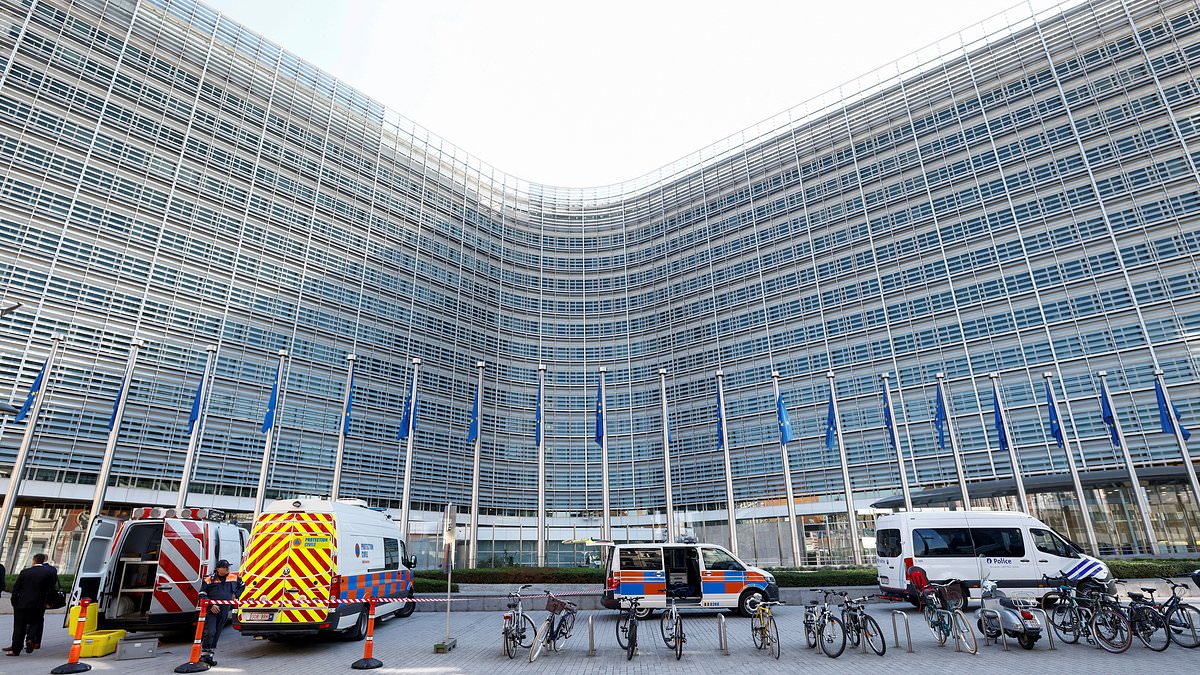Britain handed over more than £9billion to Brussels last year as Eurocrats squandered billions on aid projects.
The UK’s post-Brexit payment for leaving the bloc surged by 60 per cent to £9.3billion last year – up from £5.8billion in 2021, figures from the Office for National Statistics show.
The sum is more than Britain’s payments to Brussels for many years when it was a member of the EU.
Brexiteers say the large increase is a ‘slap in the face’ for hard-pressed families who are crying out for tax cuts while the Treasury insists it has limited room to afford them.
It comes after a report last month by the EU’s financial watchdog which found that about £7billion was paid out by the bloc in error in 2022. This included money on aid projects inside and outside of the EU.
Former Tory leader Sir Iain Duncan Smith said the news was a ‘huge slap in the face’
The UK’s post-Brexit payment for leaving the bloc surged by 60 per cent to £9.3billion last year
The European Court of Auditors said this was a ‘significant increase’ on the previous year and that the level of error was ‘material and pervasive’.
It means that UK taxpayers are continuing to fund the mistakes of bungling Brussels bureaucrats.
Responding to the figures, David Jones, a former Brexit minister, said: ‘This will stick in the craw of taxpayers.
‘People will be looking at this and saying, ‘Why are we continuing to make a contribution to this almighty wasteful and profligate organisation that is the EU?’
‘My view at the time of the [Brexit] negotiations was that we didn’t owe them a penny and a Lords sub-committee said as much. But, ultimately, we were keen to have a free trade agreement with the EU so we agreed to pay them over the odds.’
Former Tory leader Sir Iain Duncan Smith added: ‘This is a huge slap in the face for taxpayers. It seems totally excessive. It’s time for us to just draw a line in the sand and say, ‘We’ve left’.
‘We’re still hooked in and paying money and all they’re doing is wasting it. That money would be much better spent here in the UK getting the economy growing.’ Britain agreed to make the payments under the terms of the Withdrawal Agreement after leaving the bloc’s institutions in January 2020.
In July 2021, Downing Street rejected an EU estimate of a total bill of nearly £41billion.
The Government insisted the figure was between £35billion and £39billion.
But in July 2022, the Government’s own estimate put the bill higher, at £42.5billion.
It said the rise was due to the most recent valuation of the UK’s obligation for EU pensions.
Much of the money relates to things the UK committed to while it was a member of the EU but had not yet funded and which Brussels claimed it needed to pay.
One reason for the payment increase is because settlements in 2021 only started partway through the year.
When Britain was a full EU member, its net contribution ranged from £8.9billion in 2017 to £9.4billion in 2019.
Frank Furedi, head of the MCC Brussels think-tank, said: ‘From our work in Brussels, we know that people in the EU have serious questions and concerns about the lack of transparency, accountability and common sense surrounding spending at the EU.
‘UK citizens should feel all the more concerned that, having exited, they are still writing large cheques to the EU bureaucrats and largely signing those cheques in the dark.’
From January, Britain will pay Brussels a further £2.2billion annually to be part of Horizon, the EU’s scientific research programme.
The deal was struck in September by Rishi Sunak so that UK scientists have access to an £81billion funding pot. But some Brexiteers have questioned the cost of this.
A Treasury spokesman said: ‘We have taken back control of our rules and borders and our 2022 payment doesn’t reflect what we’ll pay in the future.’
